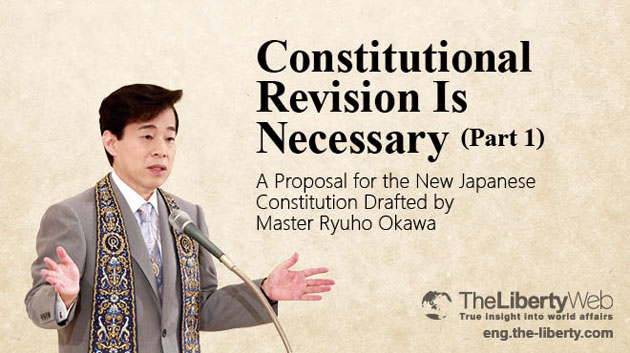Constitutional Revision Is Necessary (Part 1):
A Proposal for the New Japanese Constitution Drafted by Master Ryuho Okawa
It has been exactly four years since Master Ryuho Okawa, the Founder and CEO of the Happy Science Group, announced his proposal for a new Constitution of Japan. The current constitution may, with some changes in interpretation, be able to protect the country. However, given the seriousness of the recent crises caused by China’s military expansion and its advancement toward the East and South China Seas, a fundamental discussion on the revision of the constitution is really necessary. Within the following examination of Master Okawa’s constitutional proposal, we’ll explore ways for all of us to bring peace and prosperity to Japan and the rest of the world.
(Jiro Ayaori, Chief Editor of The Liberty)
A Proposal for the New Japanese Constitution Drafted by Master Ryuho Okawa
[Preamble] We, the People of Japan, taking the Will of God and Buddha as our own striving for the peace, progress and prosperity of Japan and of the entire world, ordain that the true nature of humans as children of God and Buddha is the basis of human dignity, do hereby establish this new Japanese Constitution.
Article 1. We, the People, make it our principle to value harmony and prevent unnecessary conflicts. We shall, moreover, actively endeavor to realize world peace.
Article 2. Freedom of religion is guaranteed to all.
Article 3. Administration shall be conducted under a presidential system, with the president to be chosen by popular vote. The procedures for choosing the president and term of office shall be stipulated by law.
Article 4. The president shall be the head of state, as well as the individual with the ultimate responsibility for national defense. The president has the authority to appoint or dismiss ministers of state.
Article 5. A defensive military, composed of land, naval, and air forces, shall be established for the protection of the lives, safety, and property of the nation’s people. The police shall be responsible for maintaining domestic public order.
Article 6. A National Diet, comprised of parliamentary members chosen directly by the people, shall promulgate all laws, except for presidential orders. The number of parliamentary representatives, their terms of office, and the composition of the Diet shall be decided by law.
Article 7. When a law passed by the Diet is in conflict with a presidential order, the chief justice of the Supreme Court shall mediate a resolution of the issues involved. If no conclusion is reached within two weeks, then the presidential order shall have priority.
Article 8. The courts shall consist of a three-tiered judicial system. The chief justice of the Supreme Court shall be elected by the People from among the virtuous candidates who possess professional knowledge of the law.
Article 9. Government employees shall be appointed according to ability, and shall be compensated commensurate with their actual accomplishments. Government employees are charged with the mission of supporting the nation and will serve the people of Japan.
Article 10. The people of Japan are guaranteed equality of opportunity, and every freedom not proscribed by law.
Article 11. The nation shall ceaselessly strive for small government and low taxes. People’s freedom to participate in politics must be guaranteed to all.
Article 12. Members of the mass media must not abuse their rights and must bear their responsibilities in good conscience and serve the citizens at all times.
Article 13. While local governments shall be respected, the local areas shall not forget their duties to the nation as a whole.
Article 14. The Imperial system shall be respected along with other cultural traditions. However, the related functions and specifics thereof shall be stipulated by law, within such scope that the independence of the three branches of government—executive, legislative, and judicial—shall not be infringed upon.
Article 15. The new constitution shall in all respects supersede the former constitution. With the agreement of the president, the constitution may be amended if the majority of Diet members pass a proposal to the effect, and the proposed change should be subsequently approved in a national referendum.
Article 16. Any items not explicitly contained in this constitution shall be stipulated in presidential orders or laws passed by the Diet.



















